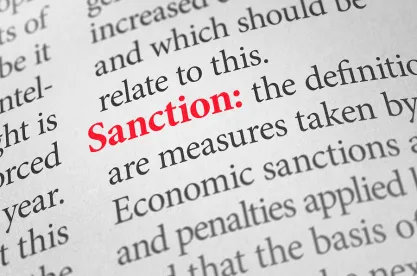With Russian forces massing at the Ukrainian border, the U.S. and EU have been warning of severe economic sanctions. While we wait and watch this brinksmanship play out, it is worth considering how businesses, and particularly banks, might prepare for what comes next.
There are a number of proposed sanctions being floated in Washington but, likely, the two moves carrying the most significant impact would be: cutting Russia off from the SWIFT system, and sanctioning major Russian financial institutions.
The Race is Not to the SWIFT
The Society for Worldwide Interbank Financial Telecommunications, or SWIFT, has been a cornerstone of global transactions since the 1970s. However, it is not the only means of international financial movement. If the United States pressures SWIFT to exclude Russia, as it did with Iran in 2012, the isolating effect may not be as dire. In the case of Iran, disconnection from the SWIFT system was a near-final step in a long campaign of severing ties between the international financial system and Iranian financial institutions. By contrast, Russia is still a significant participant in the global economy.
Further, Russia has been developing its own payment system since it was threatened with a SWIFT cutoff in 2014 in retaliation for its invasion of the Crimea. The Russian System for Transfer of Financial Messages (SPFS) is nowhere near as developed as SWIFT, but it already handles about 20% of all domestic Russian financial communications.[1]
Finally, Russian banks and multinationals looking for ways to move money may find a warm welcome in the growing Chinese Cross-border Interbank Payment System (CIPS). Like the SPFS, the CIPS network is tiny compared to SWIFT.[2] However, CIPS has users in 100 countries, and it is likely that the People’s Bank of China, which administers the system, would be glad to broaden its reach and be seen as an alternative to banking systems other countries may view as too tightly controlled by U.S.-driven policy.
Cutting Russia off from SWIFT would certainly have a jarring near-term effect on the Russian economy, as well as on businesses buying and selling in Russia. However, the sanctions will not stop trade with Russia in its tracks. They will simply move the Russian economy onto tracks that less solid, still being constructed, but that are still expanding.
Take it to the Bank(s)
Washington may target an even greater sanctions pressure point by blocking major Russian banks. Draft legislation[3] suggests that the following banks may be targeted:
-
Sberbank
-
VTB
-
Gazprombank
-
VEB
-
Russian Direct Investment Fund (RDIF)
-
Promsvyazbank
That is a pretty heavy list of Russian financial institutions, and the proposed sanction is not some minor restriction, it is a total blocking of any property that comes within the possession or control of a U.S. person. That would effectively cut any designated bank off from use of the U.S. Dollar or any transactions involving the U.S. banking system.
Blocking different combinations of those banks may have different effects on Russia. For instance, VEB is a development bank for the Russian Government and RDIF is a soverign-wealth fund that supports major government projects. Blocking those banks might frustrate the projects of Russia’s leadership and their oligarch supporters. By contrast, a sanction against Russia’s largest domestic bank, Sberbank, may cause disruption for numerous small businesss and individual customers among the general Russian population.
What Comes Next
There is still a good chance that both sides in the standoff over Ukraine back down, or that the United States takes a path involving lesser or no sanctions (recall there was talk in 2014 of a SWIFT cutoff in response to Russia’s annexation of Crimea, but it never materialized). However, if your business has a presence in Russia or does business with Russia, this may be the time to game out the possible scenarios and how your company will respond to them.
We cannot predict the future (though reading this blog, you may know that we sure do try!) but we can prepare for what it may bring, and the companies that prepare best may not be in perfect position, but they will be best equipped to respond and succeed in the face of rapid international economic changes.
FOOTNOTES
[1] “the Russian platform had more than 400 member banks – including two dozen from former Soviet states – and handled one-fifth of all domestic financial communications, as of the end of 2020.: https://www.rferl.org/a/russia-swift-nuclear-option/31601868.html
[2] https://www.bofit.fi/en/monitoring/weekly/2021/vw202128_4/
[3] Proposed Amendment to the National Defense Authorization Act (NDAA): https://www.documentcloud.org/documents/21114594-menendez-4832



 />i
/>i

